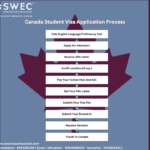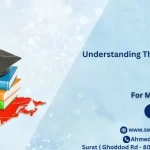Studying in the United Kingdom after 12th grade is a dream for many Indian students. With world-class education, a culturally diverse environment, and innovative teaching methods, UK universities open up opportunities to explore various fields of study. In this guide, we’ll delve into the courses available, eligibility requirements, the application process, financial considerations, and more. Whether you are interested in Arts, Commerce, Science, or specialized fields like Law and Medicine, this multi-part article is designed to equip you with all the information needed for a successful application and study experience.
Why Choose The UK For Further Studies?
- World-Class Education: UK universities are renowned for academic rigour and innovative research.
- Global Recognition: Degrees from top UK institutions are recognized and respected worldwide.
- Cultural Diversity: The UK is a melting pot of cultures, providing international students with a unique multicultural experience.
- Networking Opportunities: With connections to global industries and an active alumni network, UK education often opens doors to international careers.
- Flexible Study Options: From traditional degrees to diplomas and vocational courses, there is flexibility to tailor your education path.
Popular Courses To Study In The UK After 12th
UK universities offer a vast range of undergraduate courses, allowing students to select programs that match their academic interests and career aspirations. Here are some broad categories of courses available:
- Arts & Humanities: Focusing on creative expression, critical analysis, and cultural studies.
- Commerce & Business Studies: Emphasizing business administration, economics, accounting, and finance.
- Science & Engineering: Offering programs in physical sciences, engineering, computer science, and technology.
- Medical & Health Sciences: Including pre-medical, biomedical sciences, nursing, and allied health programs.
- Law: Providing foundational legal education with an international perspective.
- Diploma & Vocational Courses: Practical programs that emphasize hands-on learning and quick entry into the workforce.
This diversity ensures that students from various academic backgrounds—be it arts, commerce, or science—can find a course that aligns with their interests while also benefiting from a globally recognized education system.
Expert Guidance Every Step Of The Way
Our team is comprised of visa specialists with an exceptional track record. We’ll provide personalized advice, answer all your questions, and ensure you understand every aspect of the application process.
Key Considerations For Indian Students
Before diving into course-specific details, it’s essential to consider several factors:
- Academic Performance: Strong grades in 12th, with relevant subjects, depending on the course of choice.
- English Proficiency: Most courses require evidence of proficiency (IELTS/TOEFL).
- Financial Planning: Understanding the costs involved and exploring scholarships or financial aid options.
- Visa and Immigration: Familiarize yourself with the UK student visa process, including the Tier 4 (General) Student Visa requirements.
Arts Courses To Study In The UK After 12th
UK universities are celebrated for their creative arts programs, which combine theoretical learning with hands-on practice. Here are some popular arts courses along with suggested institutions:
- BA in Fine Arts:
Course Focus: Painting, sculpture, digital art, photography, and multimedia.
Suggested Universities:- University of the Arts London (UAL): Offers specialized courses in fine art and design.
- Royal College of Art: Renowned for postgraduate arts; some institutions offer integrated undergraduate pathways in collaboration with other colleges.
- Goldsmiths, University of London: Known for innovative art and design programs.
- BA in English Literature or Creative Writing:
Course Focus: Critical analysis, creative writing techniques, and literary studies.
Suggested Universities:- University of Oxford: Offers a rigorous curriculum in English literature with a strong emphasis on critical thinking.
- University of Cambridge: Provides an immersive literary experience with a focus on historical and modern texts.
- King’s College London: Recognized for its diverse modules and research-led teaching in literature.
- BA in History or Cultural Studies:
Course Focus: Research, archival studies, and exploration of cultural heritage.
Suggested Universities:- University of Edinburgh: Offers excellent programs in history and cultural studies, blending tradition with contemporary perspectives.
- University of Bristol: Known for its interdisciplinary approach and rich historical archives.
- SOAS University of London: Particularly strong in cultural studies with a global focus.
- Performing Arts and Music Degrees:
Course Focus: Drama, dance, film studies, and music, with an emphasis on performance and production.
Suggested Universities:- Royal Academy of Dramatic Art (RADA): Prestigious institution for drama and performance.
- Guildhall School of Music and Drama: Highly respected for both music and theatrical training.
- London Academy of Music and Dramatic Art (LAMDA): Offers comprehensive training in performance arts.
Career Prospects: Graduates can pursue careers in creative industries, education, media, and cultural management.
Commerce Courses To Study In The UK After 12th
For students interested in business and finance, UK commerce courses provide both theoretical foundations and practical experiences.
- BBA (Bachelor of Business Administration):
Course Focus: Management, marketing, entrepreneurship, and organizational behaviour.
Suggested Universities:- University of Warwick: Highly regarded for its business school and strong industry links.
- University of Manchester: Offers dynamic programs with global business exposure.
- Cass Business School, City, University of London: Known for its innovative business education.
- BCom (Bachelor of Commerce):
Course Focus: Accounting, finance, economics, and business law.
Suggested Universities:- London School of Economics and Political Science (LSE): World-renowned for economics and commerce.
- University of Edinburgh: Provides a robust commerce curriculum with an international perspective.
- University of Bristol: Combines strong academic theory with practical applications.
- BA in Economics:
Course Focus: Microeconomics, macroeconomics, econometrics, and economic theory.
Suggested Universities:- LSE: Offers specialized courses in economic theory and policy-making.
- University of Cambridge: Provides a research-intensive approach to economics.
- University of Oxford: Renowned for its rigorous economic curriculum.
- Specialized Courses in Accounting and Finance:
Course Focus: Financial analysis, auditing, taxation, and corporate finance.
Suggested Universities:- University of Warwick: Offers tailored programs with strong links to the finance industry.
- Imperial College London: Recognized for its quantitative and analytical approach.
- University of Manchester: Provides excellent industry placements and practical exposure.
Career Prospects: Graduates can explore careers in banking, financial services, consultancy, and entrepreneurial ventures.
Science Courses To Study In The UK After 12th
UK science programs cater to both students from a medical background and those from a non-medical science stream, offering specialized training and research opportunities.
A. Medical Stream
Students with a strong background in Biology and Chemistry have several options to build a foundation for a healthcare career:
- Pre-Medical or Health Sciences Courses:
Course Focus: Human biology, chemistry, introductory medical practices.
Suggested Universities:- University of Glasgow: Offers foundation courses in health sciences leading to medical programs.
- University of Leeds: Provides pre-medical tracks with strong laboratory components.
- BSc in Biomedical Sciences:
Course Focus: Genetics, physiology, microbiology, and laboratory techniques.
Suggested Universities:- King’s College London: Known for its robust biomedical sciences program with clinical exposure.
- Imperial College London: Offers cutting-edge research and modern facilities.
- University of Birmingham: Recognized for its research in biomedical innovation.
- Nursing and Allied Health Courses:
Course Focus: Nursing, physiotherapy, radiography, and allied healthcare.
Suggested Universities:- University of Southampton: Provides comprehensive training in nursing and allied health.
- University of Nottingham: Known for strong clinical placements and research-led teaching.
Career Prospects: Graduates can work in hospitals, research labs, and public health sectors.
B. Non-Medical Stream
Students with a keen interest in Physics, Chemistry, Mathematics, or Engineering have a broad spectrum of opportunities:
- BSc in Physics, Chemistry, or Mathematics:
Course Focus: Theoretical and applied sciences with opportunities for specialization.
Suggested Universities:- University of Cambridge: Offers world-class science programs with a strong research focus.
- University of Oxford: Renowned for its rigorous curriculum in the natural sciences.
- Imperial College London: Known for advanced facilities and interdisciplinary research.
- Engineering Courses:
Course Focus: Civil, mechanical, electrical, computer, and aerospace engineering.
Suggested Universities:- Imperial College London: Excelling in engineering disciplines with a strong global reputation.
- University of Manchester: Offers a broad range of engineering specializations and industry links.
- University of Bristol: Known for its research-driven and innovative engineering programs.
- Computer Science and Information Technology:
Course Focus: Software development, cybersecurity, AI, and data science.
Suggested Universities:- University of Edinburgh: Renowned for its computer science program and research initiatives.
- University College London (UCL): Offers robust programs in IT and digital innovation.
- University of Warwick: Known for combining theoretical knowledge with practical applications in IT.
- Environmental Science and Biotechnology:
Course Focus: Sustainability, conservation, bioengineering, and innovative research.
Suggested Universities:- University of Exeter: Offers specialized courses in environmental science and sustainable development.
- University of Leeds: Known for its interdisciplinary approach to biotechnology.
- University of Surrey: Provides excellent facilities for research in environmental technologies.
Career Prospects: Graduates can pursue roles in technology, research, engineering, environmental management, and more.
Study MBBS In The UK After 12th For Indian Students
While the traditional MBBS route in the UK is highly competitive and generally not a direct entry after the 12th, there are alternative pathways:
- Direct Entry Challenges & Alternative Pathways:
UK medical schools usually require a foundation year or pre-medical program before entering an MBBS program.
Suggested Universities & Programs:- Newcastle University Medical School: Offers foundation courses aimed at preparing international students for entry into medicine.
- St George’s, University of London: Provides integrated medical courses with preparatory programs.
- University of Dundee: Known for its flexible entry pathways and strong support for international students.
- Academic & Extracurricular Requirements:
Prospective students should excel in Biology, Chemistry, and related subjects, and gain relevant healthcare exposure.
Career Prospects: Graduates who successfully navigate this pathway can pursue a fulfilling career in medicine, with further specialization through postgraduate training.
Diploma Courses To Study In The UK After 12th
Diploma courses in the UK offer an excellent alternative to full degree programs, especially for students who prefer a more practical, hands-on approach. These programs are designed to equip you with industry-relevant skills over a shorter duration.
- Vocational Diplomas:
Hospitality, Tourism, Digital Marketing, and Event Management.
These courses are highly focused on job-specific skills and are often developed in partnership with industry leaders. - Technical and IT Diplomas:
Diplomas in Computer Applications, Graphic Designing, and Network Security.
These programs provide practical training and certifications that enhance employability in the technology sector. - Engineering & Applied Sciences Diplomas:
Courses in Mechanical, Electrical, and Civil Engineering.
They combine theoretical knowledge with lab-based and workshop experience, serving as a stepping stone to further studies if desired. - Business and Management Diplomas:
Diplomas in Business Administration, Accounting, and Entrepreneurship.
These courses often include real-life case studies, internship opportunities, and networking events.
Career Benefits: Diploma programs are ideal for students looking to quickly enter the workforce with robust technical and practical expertise. They also offer a pathway to further academic study should you decide to pursue a degree later.
Study Law In The UK After 12th
UK law degrees (LLB) provide an in-depth understanding of legal principles, with a strong emphasis on the common law system. The curriculum is designed to be both theoretical and practical, preparing you for a successful legal career.
- Core Areas Covered:
Contract Law, Criminal Law, Constitutional Law, Tort Law, and International Law.
Many programs also offer specializations such as corporate law, human rights law, or environmental law. - Practical Exposure:
Moot courts, legal clinics, internships, and workshops.
These opportunities help build essential skills such as legal research, advocacy, and negotiation. - Global Perspective:
UK law degrees are recognized internationally, allowing graduates to pursue careers not only in the UK but also globally. However, if you intend to practice law in India, additional qualifications or exams might be necessary.
Career Benefits: Graduates can pursue careers in law firms, corporate legal departments, public service, or international organizations.
Top 10 UK Universities To Study After 12th
Choosing the right institution is crucial for your academic and professional growth. Here is a potential list of top UK universities that consistently rank high in international assessments and are popular among Indian students:
- University of Oxford
Renowned for its rich history and rigorous academic environment, Oxford offers a wide range of undergraduate programs across disciplines. - University of Cambridge
Known for its research-led teaching and vibrant collegiate system, Cambridge is a top choice for students aiming for excellence. - Imperial College London
Specializes in science, engineering, and medicine, offering state-of-the-art research facilities and industry connections. - London School of Economics and Political Science (LSE)
A leader in social sciences, economics, and politics, LSE attracts students from around the globe. - University College London (UCL)
Offers diverse courses in arts, science, engineering, and law, with a strong emphasis on interdisciplinary studies. - University of Edinburgh
Combines rich heritage with modern research, particularly in medicine, humanities, and social sciences. - King’s College London
Notable for its law, humanities, and health sciences programs, with strong ties to professional sectors in London. - University of Manchester
Provides comprehensive programs in science, engineering, business, and arts, supported by extensive research initiatives. - University of Bristol
Offers a balanced mix of traditional and modern courses, with a focus on innovation and student support. - University of Warwick
Recognized for its business, economics, and engineering courses, Warwick has a strong reputation for graduate employability.
Tip: This list is dynamic—specific course strengths may vary by university. Always check the latest university rankings and course details to find the best fit for your interests.
Eligibility Criteria For Studies After 12th In The UK
Meeting the eligibility criteria is essential for a successful application. Although requirements may vary by course and institution, some general criteria include:
- Academic Performance:
A strong academic record in your 12th-grade examinations. Specific grade thresholds depend on the course and university. - Subject Requirements:
Some courses require a background in particular subjects (e.g., Mathematics and Physics for Engineering, Biology and Chemistry for Medical-related courses). - English Proficiency:
Proof of English language proficiency is mandatory. Accepted tests include IELTS, TOEFL, or Cambridge English qualifications. - Additional Assessments:
Certain programs, especially in medicine (e.g., UCAT) or law (e.g., LNAT), might require additional entrance exams or interviews.
Documents Required For Studying In The UK
Preparing the necessary documentation is a crucial step in the application process. The following documents are typically required:
Curriculum Vitae (CV):
If applicable, a CV highlighting your academic achievements, extracurricular activities, and any relevant work experience.
Academic Transcripts & Certificates:
Your 12th-grade mark sheets, certificates, and other academic records.
Proof of English Proficiency:
IELTS, TOEFL scores, or other recognized English language test results.
Statement of Purpose (SOP):
A personal essay that outlines your academic goals, career aspirations, and reasons for choosing the UK.
Letters of Recommendation:
Typically from teachers or academic mentors who can attest to your academic abilities and potential.
Passport Copy:
A valid passport with sufficient validity for the duration of your studies.
Financial Documents:
Evidence of sufficient funds to cover tuition fees and living expenses, such as bank statements or financial sponsorship letters.
UK University Intake Seasons
While universities in the UK set their application deadlines and processes for different programs, knowing the key intake seasons can be a huge advantage for Indian students planning to study after 12th grade. Here’s a breakdown of the main intake periods:
Fall Intake (September):-This is the most popular intake season, attracting a large number of applicants. It’s ideal if you’re ready to begin your studies in the fall and have all your documents in order. Applicants can apply by June end or July mid-week.
Fall Intake (January): There’s also a less common winter intake for January admissions. However, this option is limited to specific universities and programs. Applicants can apply by October end or November mid-week
Consider the intake IF:-
- You’re waiting for your final degree or transcripts to be issued.
- You’re planning to take language proficiency tests like IELTS or TOEFL and need more time.
Choosing the Right Intake
The best intake season for you depends on your circumstances. The September intake might be ideal if you’re well-prepared and ready to begin your studies as soon as possible. However, the January intake might be a better fit if you need more time or flexibility.
By understanding the UK university intake system, you can choose the best time to apply and increase your chances of securing a place in your dream program.
Maximize Your Chances Of Visa Success
With our proven approach and in-depth knowledge of UK visa requirements, we’ll significantly increase your chances of securing your student visa and turning your UK study dreams into reality.
Application Process For Admission To UK Universities
Navigating the UK application process can seem complex, but breaking it down into clear steps can simplify your journey:
- Research & Shortlist:
Explore course options and universities based on your interests, academic profile, and career goals. Use resources like UCAS, university websites, and ranking guides. - Prepare Application Documents:
Gather all necessary documents such as academic transcripts, English proficiency test scores (IELTS/TOEFL), SOP, letters of recommendation, passport copy, and financial documents. - Apply via UCAS or Directly:
For most undergraduate courses, applications are submitted through UCAS (Universities and Colleges Admissions Service). Some universities also offer direct applications on their websites. - Entrance Exams & Interviews:
Depending on the course, you may be required to take additional tests (e.g., UCAT for medicine, LNAT for law) or attend interviews. - Receive & Respond to Offers:
Once your applications are reviewed, you might receive conditional or unconditional offers. Respond within the stipulated deadline to secure your place. - Confirm Enrollment:
After accepting an offer, follow the university’s enrollment instructions, which may include paying a deposit and completing further paperwork.
UCAS Application Process
The University and Colleges Admissions Service (UCAS) manages applications to universities in the UK. Here’s a step-by-step guide:
- Choose Your University: Research universities and programs that align with your interests and career goals. Consider ranking platforms like QS or Times Higher Education for subject-specific rankings.
- Check Eligibility: Ensure you meet the specific requirements listed on the chosen university’s website for your desired program.
- Apply Through UCAS: Most universities use UCAS. Create an account, fill out the application form, and upload the necessary documents.
- Track Your Application: UCAS provides a platform to track your application status.
- Financial Planning: Demonstrate sufficient funds to cover tuition and living expenses. Explore scholarships to offset costs.
UK Admissions Timeline
Understanding the timeline is crucial for planning:
- Early Research (6-12 Months Prior):
Begin researching courses and universities, and prepare for any required entrance exams. - Application Deadlines:
- UCAS Applications: Typically close in January for most courses.
- Direct Applications: These may have varying deadlines, so check each university’s schedule.
- Interviews/Exams:
Scheduled a few months after application submission (usually between February and April). - Offer Letters:
Most offers are issued between March and May, allowing you time to finalize plans. - Acceptance & Visa Process:
Once an offer is accepted, start the visa application process immediately—ideally by early summer—to ensure timely processing.
Cost of Studying in the UK
Studying in the UK involves several cost factors. Here’s a breakdown:
- Tuition Fees:
International fees vary by course and institution, ranging approximately from £10,000 to over £30,000 per year for most programs. - Living Expenses:
Estimated at around £10,000 to £15,000 per year. This can vary by location; for example, living costs in London are generally higher than in other parts of the UK. - Additional Expenses:
Include accommodation, travel, study materials, and the NHS surcharge for health insurance. - Financial Planning:
It is advisable to prepare a detailed budget and explore part-time work options or internships to help manage living expenses.
UK Student Visa Requirements
For Indian students, the UK student visa (Tier 4 General) process involves several key steps:
- Confirmation of Acceptance for Studies (CAS):
Your chosen university will issue a CAS once you meet their conditions. This document is essential for your visa application. - Proof of Financial Support:
You must demonstrate that you have sufficient funds to cover tuition fees and living expenses for the duration of your course. Bank statements or sponsorship letters are typically required. - English Proficiency:
Submit your IELTS, TOEFL, or equivalent scores to prove your ability to study in an English-speaking environment. - Visa Application & Fee:
Complete the online visa application, pay the required fee, and book a biometric appointment. - Biometric & Supporting Documents:
Attend the biometric appointment and provide all necessary supporting documents such as passport, academic records, and financial evidence. - Processing Time:
It is important to apply well in advance, as processing times can vary. Start the visa application as soon as you receive your CAS.
Scholarships And Work Options For Indian Students
While the UK boasts world-class education, the cost can be a hurdle. To bridge this gap, numerous scholarships and financial aid options are available for deserving Indian students pursuing their studies after 12th grade.
Merit-Based Scholarships
- UK Government Scholarships: The UK government offers prestigious scholarships like Chevening Scholarships and Commonwealth Scholarships, recognizing the academic excellence of international students.
- University Scholarships: Many universities in the UK have their scholarship programs for international students. Explore options offered by your chosen universities.
- Other Scholarships: Look into scholarships like Felix Scholarships, Rhodes Scholarships, Erasmus Mundus, Cambridge Trust Scholarships, Axol Science Scholarships, and OCSI (Oxford and Cambridge Society of India) scholarships.
Beyond Scholarships: Part-Time Work
To supplement scholarship funds or manage living expenses, Indian students on a valid visa can take up part-time work. You’re allowed to work 20 hours per week during term time and full-time during holidays.
The recent introduction of a 2-year post-study work visa by the UK government makes it an even more attractive destination for international students, allowing them to gain valuable work experience after graduation.
By exploring scholarships, part-time work options, and the extended post-study work visa, Indian students can make studying in the UK a more financially feasible and enriching experience.
Additional Tips To Consider
- Start Early: Research universities and deadlines well in advance.
- Craft a Compelling Application: A strong SOP and resume are crucial.
- Connect with Professionals: Network with professionals in your field of interest.
- Consider Part-Time Work: Explore legal part-time work options to support yourself during your studies.
Ready To Ditch The Stress And Take The First Step Towards Your UK Education?
Contact us today for a free consultation and let our student visa experts help you soar toward your academic aspirations!
Conclusion
Studying in the UK can be a life-changing experience. With careful planning, thorough research, and the information provided in this guide, you can turn your dream of studying abroad into a reality. Our guide has provided a detailed look at the application process, key timelines, financial considerations, visa requirements, and scholarship opportunities for Indian students planning to study in the UK after the 12th. With careful planning, timely preparation of documents, and thorough research into courses and funding options, you can successfully navigate your way through the complex process of international education.
We hope this comprehensive guide helps you take confident steps toward an enriching academic journey in the UK. Good luck with your applications and future studies!
Frequently Asked Questions
Q1. UK Universities Deadlines for Indian Students (12th Grade)?
Ans1. Deadlines for UK universities vary by program, but common intakes are Fall (September), Spring (March), and Winter (limited programs, January). Fall intake has the earliest deadlines (around January).
Q2. Fall vs. Spring vs. Winter Intake in UK Universities (Indian Students)?
Ans2. Fall intake is the most popular with the most programs. Spring intake offers fewer options but another start date. Winter intake is uncommon and program-specific.
Q3. Best Time to Apply to UK Universities After 12th Grade (Indian Students)?
Ans3. The ideal intake depends on your situation. Fall intake is best if you’re ready to start in the fall and have all documents prepared. Spring intake is an option if you miss the Fall deadline or need more time. Winter intake is a backup for awaiting transcripts or language tests.
Q4. How to Find Out Intake Deadlines for Specific Programs in UK Universities?
Ans4. Visit the university website or program page. They typically have clear information on deadlines and application procedures. Search for “[University Name] + [Program Name] + Deadlines.”
Q5. UK Eligibility Requirements for Indian Students After 12th Grade?
Ans5. Requirements vary but generally include being 18, completing Class 12 with a minimum score (around 65% Humanities, 70-80% Science/Commerce), and passing an English language test (IELTS, TOEFL).
Q6. Cost of Studying in the UK After 12th Grade (Indian Students)?
Ans6. Costs include tuition fees (vary by program and university) and living expenses (around £1,235 per month). Explore scholarships and part-time work options to manage costs. Search for “[UK University Name] + Tuition Fees” and “Cost of Living in UK for Students.”
Q7. Student Visa Requirements for Studying in the UK After 12th Grade (Indian Students)?
Ans7. Yes, you’ll need a student visa. The type depends on your program length. Undergraduate courses typically require a Tier 4 Student Visa.
Q8. Scholarships for Indian Students to Study in the UK After 12th Grade?
Ans8. Several scholarships are available, offered by the UK government and universities. Explore options like Chevening Scholarships, Rhodes Scholarships, and Commonwealth Scholarships.
Q9. Can I Work Part-Time While Studying in UK After 12th Grade (Indian Students)?
Ans9. Yes, international students with a valid student visa can work part-time (around 20 hours per week during term time, full-time during breaks).
Q10. Tips for Applying to UK Universities After 12th Grade (Indian Students)?
Ans10. Research universities and programs early. Craft a strong personal statement and resume. Network with professionals in your field. Explore scholarships and financial aid. Apply by the deadline with all required documents.






